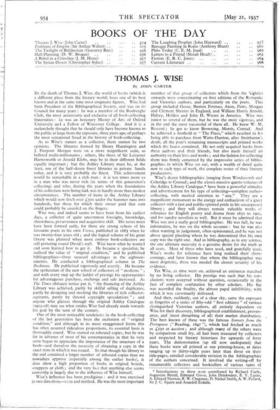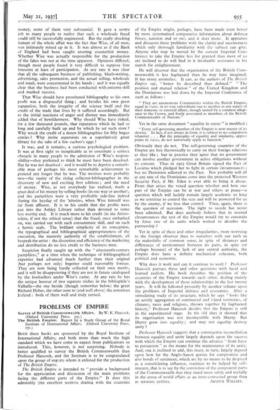THOMAS J. WISE
BOOKS OF THE DAY
By JOHN CARTER By the death of Thomas J. Wise, the world of books (which is a different place from the literary world) loses one of its best
known and at the same time most enigmatic figures. Wise had been President of the Bibliographical Society, and was on its Council for many years : he was a member of the Roxburghe Club, the most aristocratic and exclusive of all book-collecting fraternities : he was an honorary Master of Arts of Oxford University and a Fellow of Worcester College. And it is a melancholy thought that he should only have become known to the public at large from the exposure, three years ago, of perhaps the most sensational fraud in the history of book-collecting.
As to Wise's stature as a collector, there cannot be two opinions. The libraries formed by Henry Huntington and J. Pierpont Morgan were on a more magnificent scale, as befitted multi-millionaires ; others, like those of Sir Leicester Harmsworth or Arnold Klebs, may be in their different fields equally important ; but the Ashley Library must be, at the
least, one of the half-dozen finest libraries in private hands today, and it is very probably the finest. This achievement
would be remarkable in a rich man : it is ten times more so in a man who was never rich (in terms of this generation's collecting) and who, during the years when the foundations of his collection were being laid, was in hardly more than modest circumstances. The number of items in the Ashley Library which would now fetch over L50o under the hammer runs into hundreds, but those for which their owner paid that sum could probably be counied on the fingers.
Wise was, and indeed seems to have been from his earliest days, a collector of quite uncommon foresight, knowledge, shrewdness, perseverance and acquisitive skill. His tastes must
have been formed early, for there are strong echoes of his favourite poets in his own Verses, published in 1883 when he
was twenty-four years old ; and the logical scheme of his great library was planned when most embryo book-collectors are still pottering round David's stall. Wise knew what he wanted and soon learned how to get it. He became a specialist, he realised the value of " original condition," and he published bibliographies—three unusual advantages in the eighteen-
nineties. He conducted a bibliographical column in The Bookman. He publicised vigorously and acutely. He became the spokesman of the new school of collectors of " moderns " ;
and with every step up the ladder of prestige his opportunities
for advantageous purchase, exchange and sale increased. As The Times obituary notice put it, " the financing of the Ashley
Library was achieved, partly by skilful selling of duplicates, partly by designing and stocking the libraries of rich collector- aspirants, partly by shrewd copyright speculations " ; and anyone who glances through the original Ashley Catalogue (19o5-o8) may see what strides Wise had already made towards his goal by the turn of the century.
One of the most noticeable tendencies in the book-collecting of the last generation has been the exaltation of " original condition," and although in its more exaggerated forms this has often assumed ridiculous proportions, its essential basis is thoroughly sound. Wise started on rebound copies, but he was far in advance of most of his contemporaries in that he very soon began to appreciate the importance of the structure of a book—and therefore the necessity of obtaining a copy in the exact state in which it was issued. So that though his library to the end contained a larger number of rebound copies than we nowadays approve (especially among the earlier books), it does show a high proportion of books in original boards, wrappers or cloth ; and the very fast that anything else seems unworthy is largely due to the influence of Wise himself. Wise's influence has been prodigious : and it was exercised in two directions—taste and method. He was the most important member of that group of collectors which from the 'eighties onwards were concentrating on first editions of the Romantic and Victorian authors, and particularly on the poets. This group included Gosse, Buxton Forman, Axon, Potts, Morgan and Clement Shorter in England, and William Harris Arnold, Halsey, Holden and John H. Wrenn in America. Wise was junior to several of them, but he was the most vigorous, and in the end the most successful of them all. He knew W. M. Rossetti ; he got to know Browning, Morris, Conrad. And he achieved a foothold at " The Pines," which resulted in lis being able to purchase from Watts-Dunton, after Swinburne's death, all the poet's remaining manuscripts and printed works which the house contained. He not only acquired books from these authors and their friends, but also made himself an authority on their lives and works ; and the fashion for collecting them was firmly cemented by the impressive series of biblio- graphies in which Wise set out, with a wealth of detail quite new to such type of work, the complete roster of their literary productions.
Wise's dozen bibliographies (ranging from Wordsworth and Coleridge to Conrad), and the eleven massive quarto volumes of the Ashley Library Catalogue,* have been a powerful stimulus and advertisement for his type of collecting—complete author- collecting, with marked attention to "anal' They are a magnificent monument to the energy and enthusiasm of a great collector with a just and public-spirited pride in his unsurpassed library ; and they will always remain valuable works of reference for English poetry and drama from 165o to 1900, and for sundry novelists as well. But it must be admitted that Wise was not a really good bibliographer. He was full, he was informative, he was on the whole accurate : but he was also often wanting in judgement, often opinionated, and he was not above special pleading where he was determined that his own copy was the right one. And in bibliography, as in any science, the one ultimate necessity is a genuine desire for the truth at all costs. Most of those who have used, and gratefully used, Wise's works for reference have long realised their short- comings, and have known that where the bibliographer was most dogmatic, there was needed the closest scrutiny of his evidence.
Yet Wise, as time went on, achieved an eminence matched by no living collector. His prestige was such that his con- clusions were accepted without question, occasionally in the face of complete confutation by other scholars. His fiat was accorded the finality, the almost papal infallibility, with which it was customarily delivered.
And then, suddenly, out of a clear sky, came the exposure as forgeries of a series of fifty-odd " first editions " of various distinguished Victorian authors, all entirely dependent on Wise for their discovery, bibliographical establishment, proven- ance, and (most disturbing of all) their market distribution. The best known of these was the famous Sonnets from the Portuguese (" Reading, 1847 "), which had fetched as much as £250 at auction ; and although many of the others were by comparison small fry, all had been treasured by collectors and respected by literary historians for upwards of forty years. The demonstration (up till now undisputed) that these books were all printed at one printing-house, at dates ranging up to thirty-eight years later than those on their title-pages, entailed considerable revision in the bibliographies of the authors concerned. It involved the writing-off by innumerable collectors and booksellers of various sums of * Introductions to these were contributed by Richard Curie, Augustine Birrell, Edmund Gosse, John Drinkwater, E. V. Lucas, A. Edward Newton, R. W. Chapman, D. Nichol Smith, A. W. Pollard, Sir J. C. Squire and Arundell Esdaile.
money, some of them very substantial. It gave a severe jolt to many people to realise that such a wholesale fraud could still be successfully engineered. But the really shocking feature of the whole affair was the fact that Wise, of all men, was intimately mixed up in it. It was almost as if the Bank of England had been caught uttering counterfeit money. Whether Wise was actually responsible for the production of the fakes was not at the time apparent. Opinions differed, though most people found it very difficult to suppose him innocent at least of participation. At any rate it was clear that all the subsequent business of publishing, blurb-writing, advertising, sales promotion, and the actual selling, wholesale and retail, were concentrated in his hands ; and it was equally clear that the business had been conducted with extreme skill and marked success.
That Wise should have prostituted bibliography to his own profit was a disgraceful thing ; and besides his own great reputation, both the integrity of the science itself and the credit of the trade that lives by it suffered accordingly. But to the initial reactions of anger and dismay was immediately added that of bewilderment. Why should Wise have risked, for a few thousand pounds, that reputation which he had so long and carefully built up and by which he set such store ? Why wreck the credit of a dozen bibliographies for fifty bogus entries ? Why invite aspersions on a superlatively great library for the sake of a few cuckoo's eggs ?
It was, and it remains, a curious psychological problem. It was at first sight so inexplicable as to constitute a serious obstacle in many people to the admission of Wise's respon- sibility—they preferred to think he must have been deceived. But he was not deceived : and it would be to deprive a remark- able man of perhaps his most remarkable achievement to pretend any longer that he was. The motives were probably two—the vanity of the rising collector-bibliographer in the discovery of new and exciting first editions ; and the need of money. Wise, as not everybody has realised, made a great deal of his money by selling books (in one way or another), and the pamphlets were a very profitable side-line indeed during the heyday of the 'nineties, when Wise himself was far from affluent. It is to his credit that the profits were put into the Ashley Library rather than devoted to some less worthy end. It is much more to his credit (in the Aristo- telian, if not the ethical sense) that the fraud, once embarked on, was carried out with such consummate skill, and on such a heroic scale. The brilliant simplicity of its conception, the typographical and bibliographical appropriateness of the execution, the masterly authority of the establishment, all bespeak the artist : the discretion and efficiency of the marketing and distribution do no less credit to the business man.
Suspicion finally caught up with the " nineteenth-century pamphlets," at a time when the technique of bibliographical expertise had advanced much further than their original (but perhaps not only) begetter could reasonably foresee. They are now being busily collected on their own merits, and it will be disappointing if they are not in future catalogued by the booksellers under Wise's name. At any rate he has the unique honour of two separate niches in the bibliophile's Valhalla—the one beside (though somewhat below) the great Richard Heber, the other next to (and well above) the notorious Ireland : both of them well and truly earned.















































 Previous page
Previous page